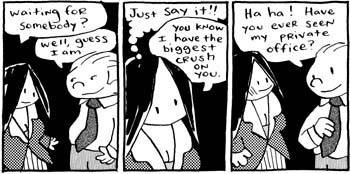![[Metroactive Books]](/books/gifs/books468.gif)
[ Books Index | Metro | Metroactive Central | Archives ]
Young Intern in Love
 Lust for Life: Bill and Monica get a message of innocence back in the new comic book 'Monica's Story.' James Kolchalka's 'Monica's Story' gives a fresh perspective on the Lewinsky affair BOTH THE STARR REPORT and the Lewinsky autobiography have ensured that little new remains to be learned about the affair between Bill and Monica. No longer will the flirtatious intern and the responsive president be turned into symbols by anyone with a keyboard or a microphone in front of them. Monica was a feminist who made her choices; Monica was a feminist misused by the patriarchy. Clinton was a degenerate spawn of the degenerate '60s; Clinton was a rabbit pursued by reactionary hounds. (The president, it's reported, has claimed to see himself as Baby Huey, an unlovable, obese giant goose in baby bonnet and diapers that the Harvey Comics company foisted on the public in children's cartoons 40 years ago. But the cartoon Clinton appeared in was more like a Bugs Bunny opus, with Ken Starr as Elmer Fudd staring into the empty hole where his quarry used to be, cursing the wascally twickster.) Critic Anthony Lane of The New Yorker, who reviewed the Starr report as literature, correctly saw the document as a new version of Hawthorne's The Scarlet Letter. Yet the thickness of the dossier on Clinton, and the fact that every minute of his life was accounted for, reminds me more pungently of totalitarian sex hatred. Reading the description of the famous Oval Office bathroom--the only place the lovers could find privacy--made me wonder if Starr's voice would rasp out of a hidden speaker, "You are the dead," just as in the novel 1984 when the authorities discover the forbidden affair between Winston Smith and Julia. But I'd agree with Lane that what the Starr report most resembled was Vladimir Nabokov's Pale Fire. In that 1962 novel, Kinbote, a mad college professor, annotates a poem by a dead poet named John Shade. The poem is about the suicide of the poet's daughter. The way Kinbote sees it, the poem is an allegory and Shade was his lover, the exiled King of Zembla. Lane guessed that the point of the Starr report wasn't that readers should feel shame for the adulterers but that we as readers should understand that the narrator is insane. The seemingly played-out scandal has appealed to at least one sane artist. James Kochalka's Monica's Story ($2.95; 34 pages; Alternative Comics, 611 N.W. 34st Drive, Gainesville, FL 32607-2429) takes the sorry tale and transforms it into a comic book. The easy joke is to portray the relationship as an old-fashioned love comic, with heavy narration, melodramatic recriminations and realistic drawings. Such comics are always told in flashback, through tears, a tactic often used in the satirical Young Lust comics that Kitchen Sink published in the 1970s. (The cover of Young Lust #1 shows the face of a weeping woman: "Sob. A week ago he was dry-humping me in the elevator--and now he doesn't even remember my goddamn name!") INSTEAD, Kochalka starts with a series of silent panels about the flirtation; by the third page, Monica is teasing Bill with flashes of her underwear. The story unfolds from beginning to end with almost no comment, and it concludes on a happy note right before the relationship gets exposed. Monica is convinced that her love for Bill is returned. By removing the consequences of the affair, the weight of the guilt disappears. The backgrounds are minimal. With their round heads, crescent smiles and obvious blushes, the characters are essentially innocent. (Kochalka's Monica looks like Madeline from the children's books, only with a beret instead of a ribbon-bedecked straw hat.) Lewinsky's neediness and Clinton's duplicity vanish in these drawings. Kochalka's take on the affair is simple and cuddly. He brings out the tender, human sides of the fiasco. Monica's Story was commissioned by a Florida comics publisher as, I think, a provocation. Florida, whose unofficial state motto is "Graveyard of the First Amendment," has been notorious for prosecuting adult comics. In adapting Starr's multimillion-dollar exercise in state-created pornography, Kochalka and company are having a laugh at the lawmakers, confident that this is one "obscene" comic that the local authorities can't bust. As I've learned over the years, most people don't get comics. I'm not sure that even seeing the story retold in comics form can explain to the right wing why outrage against the erring Clinton wasn't as fatal as they'd hoped. Yet the great skill of cartoons is to reduce a subject to a primal, universal level. A cartoon is understood completely at a glance, and to understand everything is to forgive everything. Reading Monica's Story, one is struck anew: It was only love. It was only sex. It was nobody's business. Why weren't they left alone? [ San Jose | Metroactive Central | Archives ]
|
From the May 6-12, 1999 issue of Metro.
Copyright © Metro Publishing Inc. Maintained by Boulevards New Media.